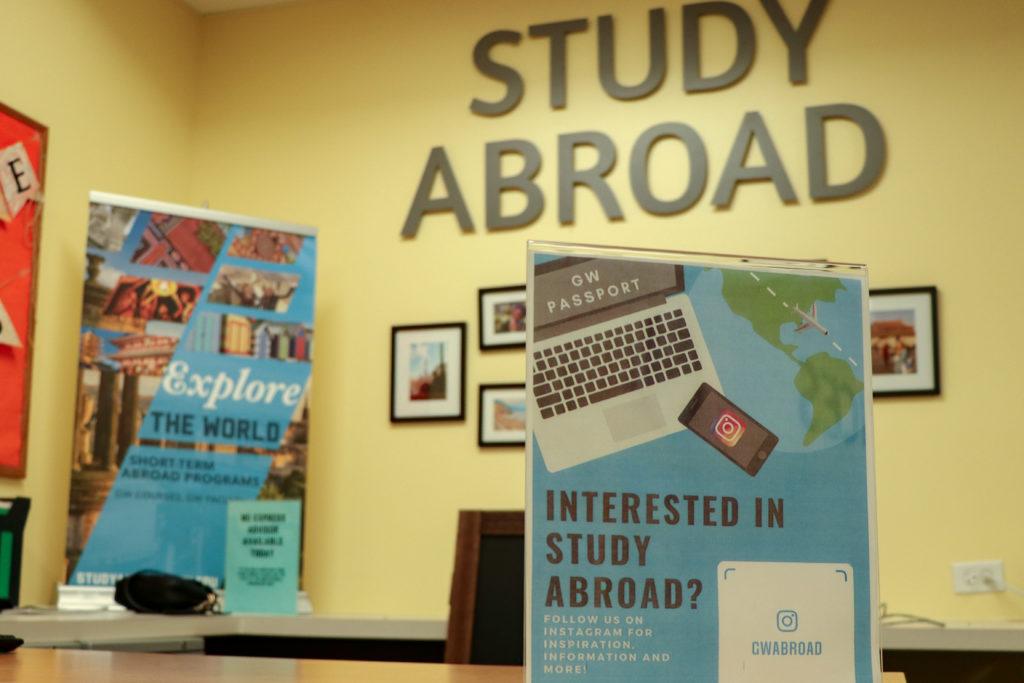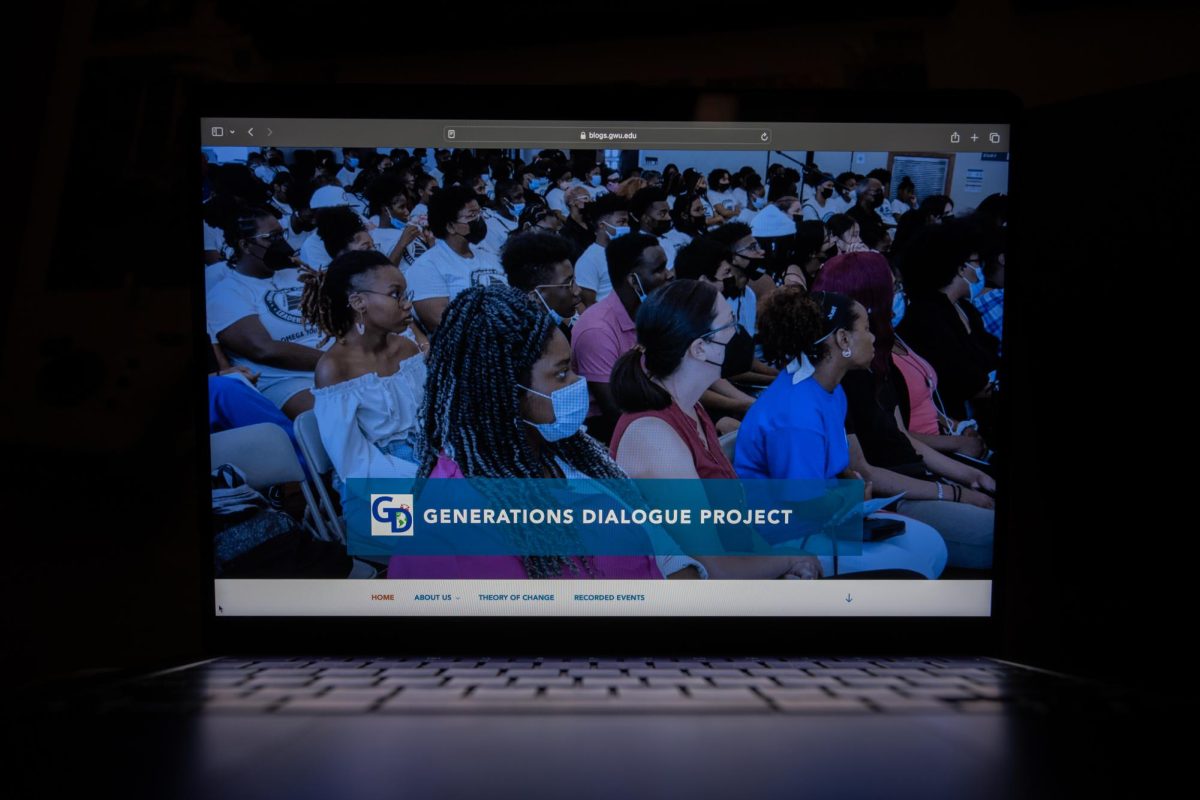Study abroad program enrollment resurged this spring but failed to bounce back to pre-pandemic levels after GW suspended programming for more than a year during the pandemic.
The number of students studying abroad this year jumped from 91 students in the fall to 297 in the spring – a roughly 220 percent increase, according to data from the Office for Study Abroad. GW-administered study abroad programs resumed in the fall while all exchange program offerings returned in the spring after officials canceled in-person study abroad during the previous academic year because of the COVID-19 pandemic.
The data show that total student enrollment in study abroad programs this academic year fell from 995 students during the 2019-20 academic year to 402 this academic year – a nearly 60 percent drop. But during the three academic years prior to the pandemic, study abroad enrollment increased on average by about 27 percent each year, according to the data.

Nicholas Anastacio | Graphics Editor
Kimberly Rush, the assistant director of the study abroad office, and Jennifer Donaghue, the executive director of international education of the study abroad office, said study abroad program officials implemented strict health and safety measures like travel restrictions outside of host countries, testing requirements and mask mandates as pandemic-related precautions in the fall before relaxing their COVID-19 restrictions in the spring.
“As the conditions continue to improve around the world, we have begun to see many programs and countries relax their pandemic-related measures and have a return to something similar to normalcy,” they said in an email.
Rush and Donaghue said the study of abroad office worked to resume programs that were not available in the fall “slowly and safely” in the spring. They said expanded programming, vaccine availability and countries’ improved handling of the pandemic during the past two years made students and families comfortable with study abroad opportunities this semester.
Rush and Donaghue said more students studied abroad this semester than in the fall because events during the fall semester, like Greek life recruitment and sports games, drew students to stay on campus in the first half of the academic year.
“Historically, we have always seen greater interest in studying abroad in the spring as compared to the fall semester,” they said.
Students currently studying abroad said the pandemic did not raise concerns about enrolling in their respective programs but narrowed down the programs available for them to enroll because of COVID-19 restrictions at GW’s partner universities abroad.
Phoebe Szosz, a sophomore majoring in history, said she is currently studying at the University of Chile in Santiago, Chile as part of the Global Bachelor’s Program, a GW program in which students study abroad twice and choose between studying abroad a third time or completing an international internship. She said she chose to study abroad during the spring semester because she wanted to spend her fall semester in person after learning virtually her freshman year.
Szosz said she was required to show proof of vaccination and a negative COVID-19 test to Chilean officials before traveling to Santiago at the start of the semester. She said Chile’s mask mandate is still in effect and her university requires students to wear masks while attending classes but does not require them to get regularly tested.
Chile has reported more than 3,500,000 COVID-19 infections since the start of the pandemic. The average number of positive COVID-19 cases reported daily in Chile decreased by more than 5,800 during the past three weeks.
Szosz said Chileans have a different mindset on the pandemic than Americans because most follow their country’s mask mandate without questioning it.
“It’s also really incredible to see that there can be strict rules and people here, the mindset is so different than the U.S., they just follow them,” she said. “It’s mind boggling that things can run smoothly.”
Isabelle Frasca, a junior majoring in international affairs, said she wanted to study abroad in the fall but chose to enroll in the International Education of Students Abroad program in Rome, Italy in the spring. Frasca said she was not concerned about studying abroad during the pandemic but was worried that the program would be canceled because of the surge in COVID-19 cases caused by the Omicron variant.
Italy’s National Health Institute reported the Omicron variant caused 96 percent of new positive COVID-19 cases in Italy in January.
“I was really worried that it was just going to get called off, and I wouldn’t have housing or classes and all this stuff, but that was kind of the extent of my pandemic concerns,” she said.
Frasca said Italy requires people to show proof of vaccination and a negative COVID-19 test when they enter the country. She said her program also has an in-class mask mandate, and Italian officials require masks in all indoor public spaces and crowded outdoor areas, like stadiums and markets. But Italian officials are considering lifting the mask mandate later this month.
She said students in her program expressed concerns that the program does not require or provide COVID-19 testing to individuals who are exposed to the virus.
“My program has actually had a lot of complaints from students because A – they don’t require testing, and B – they don’t provide testing if you’ve been exposed or if you have symptoms or anything, so that’s caused a lot of complaints,” she said.
Jerome Lucido, the executive director of the University of Southern California Center for Enrollment Research, Policy and Practice, said study abroad programs across the country have not reached pre-pandemic enrollment totals because students do not want to be abroad amid of COVID-19 case surges and tightening travel restrictions.
The United Nations’ World Tourism Organization said in November that 98 percent of global travel destinations had “some kind of travel restriction” related to the pandemic.
“I can confirm based upon our work with college enrollment leaders across the country that study abroad programs have been hampered by the pandemic,” he said in an email.
Lucido said it may take “a while” for study abroad enrollment to return to pre-pandemic numbers because of COVID-19 variants, like Omicron, and conflicts occurring around the world, like the war in Ukraine.
“International education in its many forms is a valuable experience, sometimes a once-in-a-lifetime experience, and I believe that campuses will find ways to encourage it once again,” he said.










